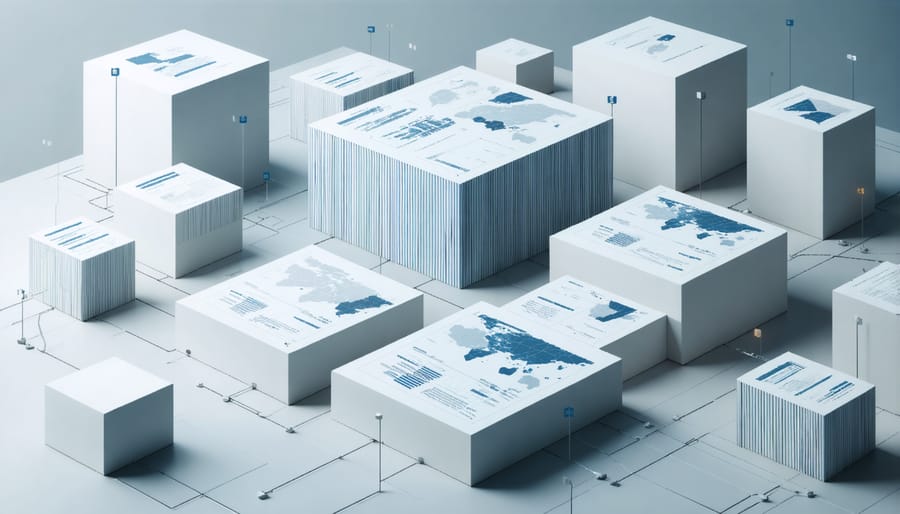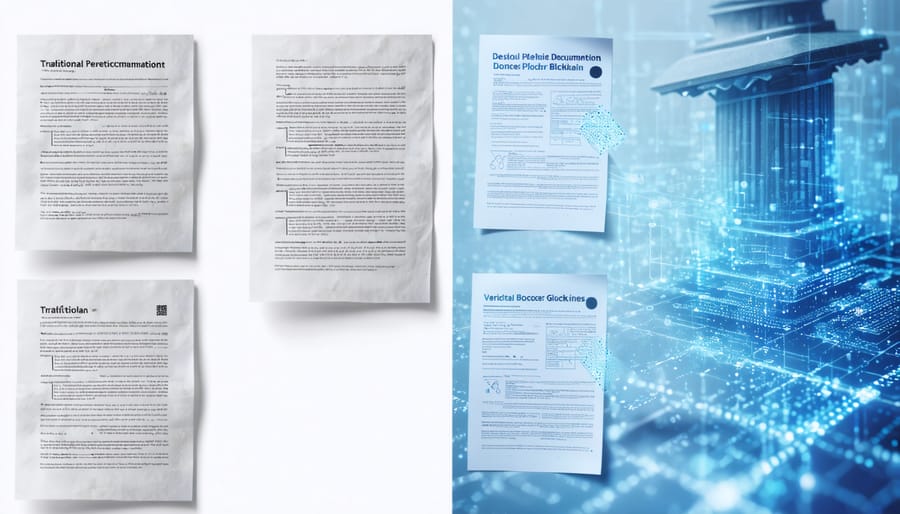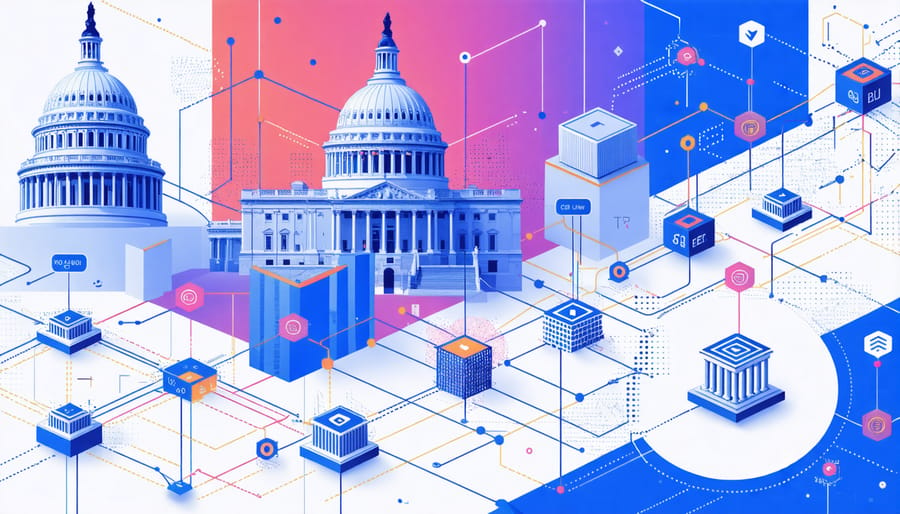Blockchain technology is revolutionizing how governments worldwide manage, secure, and validate critical infrastructure projects. As blockchain technology in construction continues to evolve, public sector agencies are leveraging this transformative tool to enhance transparency, reduce fraud, and streamline administrative processes across major construction initiatives.
From smart contracts that automatically enforce regulatory compliance to immutable audit trails that track every project milestone, blockchain’s integration into government operations represents a paradigm shift in public sector management. This technology’s ability to create tamper-proof records while enabling real-time verification of construction permits, inspections, and contractor credentials has captured the attention of forward-thinking government agencies globally.
As municipalities and federal organizations increasingly adopt blockchain solutions, the construction industry stands at the threshold of a new era in government oversight and project delivery. This transformation promises to reduce bureaucratic inefficiencies, enhance public trust, and create more resilient infrastructure development processes through decentralized verification systems and automated compliance mechanisms.

Smart Contracts Transform Building Permit Processes
Automated Compliance Verification
Smart contracts on blockchain platforms revolutionize regulatory compliance in government construction projects by automating verification processes that traditionally required extensive manual oversight. These self-executing contracts contain pre-programmed rules that align with regulatory requirements, automatically checking compliance at each project milestone.
For instance, when contractors upload documentation for building permits or safety certifications, smart contracts instantly verify if the submissions meet predetermined criteria. This automated system can check multiple parameters simultaneously, from worker certification status to material quality specifications, ensuring all regulatory requirements are met before allowing project progression.
The technology creates an immutable audit trail of compliance checks, making it easier for government inspectors and project stakeholders to review the history of regulatory adherence. Each verification event is timestamped and recorded on the blockchain, creating transparency and accountability throughout the construction process.
Major benefits include reduced processing time for compliance verification, minimized human error, and standardized enforcement of regulations across different projects. Construction firms report significant cost savings from faster approval processes and reduced compliance-related delays.
The system can also automatically flag non-compliance issues and trigger necessary notifications to relevant parties, ensuring swift resolution of regulatory concerns. This proactive approach helps prevent costly delays and potential legal issues that might arise from compliance oversights.
Critical to success is the accurate translation of regulatory requirements into smart contract code, requiring collaboration between legal experts, developers, and construction professionals to ensure proper implementation.
Real-time Permit Tracking
Blockchain technology is revolutionizing permit tracking in government agencies by creating an immutable, transparent record of permit applications, approvals, and status changes. This digital transformation enables stakeholders to monitor permit progress in real-time, significantly reducing delays and improving accountability in the construction approval process.
The system works by recording each permit-related transaction as a new block in the chain, creating a permanent, time-stamped record that cannot be altered retroactively. When a permit application is submitted, updated, or approved, the information is automatically distributed across the network, ensuring all authorized parties have immediate access to the latest status.
For example, the city of Dubai has implemented a blockchain-based permit tracking system that has reduced permit processing time by 40%. The system allows contractors, architects, and government officials to track permit applications through every stage of review, with automatic notifications when actions are required or statuses change.
Key benefits include:
– Elimination of paper-based tracking systems
– Reduced processing time and administrative overhead
– Enhanced transparency and accountability
– Prevention of permit fraud through immutable record-keeping
– Improved coordination between multiple government departments
Construction professionals can access their permit status through secure web portals or mobile applications, viewing real-time updates and receiving instant notifications about required actions or approvals. This streamlined process has significantly reduced the time traditionally spent following up on permit applications through multiple government offices.
Decentralized Project Documentation
Digital Record Authentication
Government agencies are increasingly adopting blockchain technology to enhance the verification and authentication of construction documentation. This revolutionary approach creates an immutable digital ledger that securely stores and validates essential project records, from building permits to inspection reports and safety certifications.
The implementation of blockchain-based authentication systems enables real-time verification of documents, significantly reducing the risk of fraud and unauthorized modifications. For instance, the Dubai Land Department has successfully integrated blockchain technology to secure and streamline their real estate transaction records, setting a precedent for other governmental bodies worldwide.
Construction professionals benefit from this digital transformation through simplified compliance processes and enhanced transparency. When submitting documentation for regulatory approval, blockchain ensures that all submissions maintain their integrity throughout the review process. Each document receives a unique digital fingerprint, or hash, that makes any unauthorized alterations immediately detectable.
Several government pilot programs have demonstrated the technology’s effectiveness in managing complex construction documentation. In Singapore, the Building and Construction Authority has implemented blockchain to verify Green Mark certifications, while various U.S. municipalities are exploring similar solutions for building code compliance documentation.
The system’s distributed nature ensures that multiple stakeholders – including contractors, architects, engineers, and regulatory bodies – can access and verify documents while maintaining a comprehensive audit trail. This technological advancement not only streamlines administrative processes but also strengthens the relationship between government agencies and construction industry professionals through enhanced trust and efficiency.

Secure Information Sharing
In the construction sector, secure data exchange between government agencies and contractors has traditionally been a complex challenge, often plagued by inefficiencies and security concerns. Blockchain technology offers a revolutionary solution through secure information sharing platforms that ensure data integrity and controlled access.
The implementation of blockchain-based systems enables government agencies to establish transparent, immutable records of project documentation, permits, and compliance materials. Contractors can securely submit sensitive information, such as proprietary construction methods or confidential pricing data, while maintaining control over who accesses this information and how it’s used.
Smart contracts built into these systems automatically enforce data access protocols, creating audit trails that track every interaction with shared documents. This feature proves particularly valuable during bidding processes and when managing multiple subcontractors on government projects.
For example, the U.S. General Services Administration has piloted blockchain platforms that allow contractors to securely share building information modeling (BIM) data, material certifications, and safety documentation. These systems integrate with existing document management solutions while adding enhanced security features and automated compliance verification.
The technology also facilitates real-time collaboration between government inspectors and construction teams, enabling instant verification of work completed and immediate processing of change orders. This streamlined approach significantly reduces administrative overhead while maintaining the highest levels of data security and regulatory compliance.

Government-Industry Collaboration Through Blockchain
Public Infrastructure Projects
Government agencies worldwide are increasingly adopting blockchain-based project management solutions for public infrastructure initiatives. The Dubai Roads and Transport Authority (RTA) has implemented a blockchain platform to track and manage construction projects across the emirate, resulting in a 30% reduction in documentation processing time and enhanced transparency in contractor payments.
In Singapore, the Building and Construction Authority (BCA) utilizes blockchain technology to verify and validate construction materials, ensuring compliance with building codes and safety standards. This system has dramatically reduced instances of non-compliant materials reaching construction sites and streamlined the inspection process.
The United States Department of Transportation has piloted blockchain solutions in several states for infrastructure maintenance tracking. Notable implementations include bridge inspection protocols in Michigan and road maintenance scheduling in Illinois, where smart contracts automatically trigger maintenance workflows based on sensor data and inspection reports.
Estonia’s e-Construction platform, integrated with its broader e-government infrastructure, demonstrates how blockchain can facilitate seamless collaboration between multiple agencies, contractors, and stakeholders. The platform maintains an immutable record of construction permits, safety certifications, and project milestones, while enabling real-time progress monitoring and automated compliance verification.
These implementations showcase blockchain’s potential to revolutionize public infrastructure project delivery through enhanced accountability, reduced administrative overhead, and improved coordination among stakeholders.
Regulatory Compliance Automation
Blockchain technology is revolutionizing regulatory compliance in government construction projects by creating an immutable, transparent record of all regulatory submissions and approvals. This automation streamlines traditionally complex compliance processes while reducing administrative burden and potential human error.
The technology enables real-time verification of permits, licenses, and certifications through smart contracts that automatically validate compliance requirements. When contractors upload documentation, the system instantly checks against predetermined regulatory criteria, flagging any discrepancies for immediate attention. This automated verification process significantly reduces the time traditionally spent on manual compliance checks and paperwork processing.
For example, in building permit applications, blockchain systems can automatically verify that all required documentation meets current building codes and zoning regulations. The technology creates a permanent record of compliance history, making it easier for authorities to track and verify regulatory adherence throughout a project’s lifecycle.
Several government agencies have implemented blockchain-based compliance systems, reporting up to 60% reduction in processing times and a 40% decrease in compliance-related delays. The technology also enhances transparency by providing all stakeholders with real-time access to compliance status and historical records.
Additionally, blockchain’s inherent security features protect sensitive compliance data while ensuring that only authorized parties can access and modify regulatory documentation. This combination of automation, security, and transparency is transforming how construction projects meet government regulations, making compliance more efficient and reliable.
Future Implementation Challenges
Technical Integration Hurdles
Implementing blockchain systems in government construction oversight presents several significant technical challenges that need careful consideration. The integration of legacy systems with blockchain networks remains a primary hurdle, as many government departments still rely on outdated infrastructure that wasn’t designed for distributed ledger technology. This compatibility gap often requires extensive modifications or complete system overhauls.
Another crucial challenge lies in the scalability of blockchain networks to handle the massive volume of construction data analysis and transactions. Government construction projects generate enormous amounts of data, from permit applications to inspection reports, and the blockchain infrastructure must be robust enough to process these efficiently without compromising performance.
Security protocols and access control mechanisms present additional complexity, particularly in managing multiple stakeholders with varying permission levels. Government agencies must establish sophisticated identity management systems while ensuring compliance with data protection regulations. Furthermore, the technical expertise required to maintain and upgrade blockchain systems often exceeds current government IT capabilities, necessitating significant investment in training and recruitment of specialized personnel.
Interoperability between different blockchain platforms and government departments also poses a substantial challenge, as standardization protocols are still evolving in this emerging technology landscape.
Policy and Standard Development
The implementation of blockchain technology in government operations necessitates comprehensive regulatory frameworks and standardization protocols. Industry experts emphasize the importance of establishing clear guidelines for smart contracts, data privacy, and cross-jurisdictional operations. Leading construction authorities and government agencies are collaborating to develop standards that address the unique requirements of digital project documentation and automated compliance verification.
Key policy considerations include data ownership rights, verification mechanisms for digital identities, and protocols for maintaining immutable records. Government entities must establish clear guidelines for blockchain network governance, including consensus mechanisms and participant authentication. These frameworks should also address the integration of existing building codes and regulations with blockchain-based verification systems.
Several jurisdictions have already initiated regulatory sandboxes to test blockchain implementations in construction permitting and compliance monitoring. These pilot programs are helping shape standards for digital signatures, smart contract execution, and distributed ledger interoperability. Industry stakeholders emphasize the need for flexible frameworks that can adapt to technological advances while maintaining security and accountability.
Standards development organizations are working to create unified protocols for blockchain implementation across different government departments and jurisdictions, ensuring seamless integration with existing systems and processes.
The integration of blockchain technology in government-construction relationships represents a transformative shift in how projects are managed, regulated, and executed. As demonstrated through various implementations worldwide, blockchain’s ability to create transparent, immutable records while automating compliance processes has proven invaluable in reducing administrative burden and enhancing trust between stakeholders.
Looking ahead, we can expect to see broader adoption of blockchain solutions in government oversight of construction projects. Smart contracts will likely become standard practice for contract administration, while distributed ledger technology will continue to revolutionize permit processing and compliance verification. The technology’s potential to streamline procurement processes and enhance supply chain transparency will become increasingly critical as construction projects grow in complexity.
However, successful implementation will require continued collaboration between government agencies, technology providers, and construction industry stakeholders. Investment in infrastructure, standardization of protocols, and development of comprehensive regulatory frameworks will be essential to realize blockchain’s full potential.
For construction professionals, staying informed about blockchain developments and preparing for their integration into daily operations will be crucial. Those who embrace these technological advances will be better positioned to navigate future regulatory requirements and maintain competitive advantages in an evolving industry landscape. As governments continue to modernize their processes, blockchain technology will undoubtedly play a pivotal role in shaping the future of construction project delivery and oversight.

